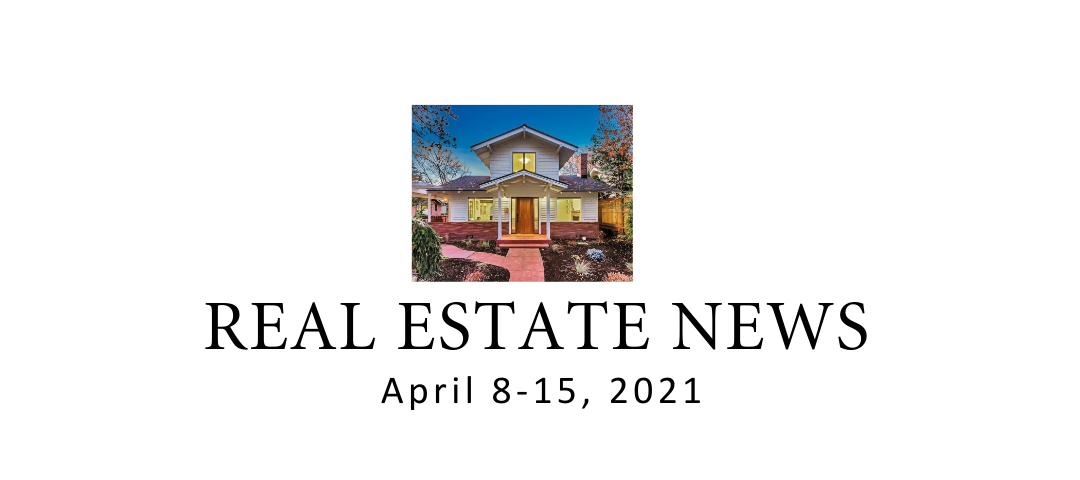
Guardian Residential Lending Industry News, April 1-8, 2021
April 8, 2021
Guardian Residential Lending Industry News, April 15-22, 2021
April 22, 2021In the Know: A Roundup of This Week’s Local and National Real Estate Stories
Mortgage Rates Suddenly Trend Downward (M Report, April 9)
Mortgage Rates Lowest in Nearly a Month
In a change of trend, mortgage rates dropped this week for the first time after seven weeks of rising, as Freddie Mac’s latest Primary Mortgage Market Survey (PMMS) reports rates dropping to an average 3.13% for the week ending April 8, 2021, down from last week’s total of 3.18%.
Freddie Mac Sees Rates and Prices Leveling Off Through 2022 (Mortgage News Daily, April 14)
Freddie Mac’s Economic and Housing Research Group finds a lot to like in the present economic Environment.
All in all, the report says conditions should remain generally favorable for the housing and mortgage market through 2022, although rising rates could provide headwinds that slow housing activity. The group predicts the 30-year fixed mortgage rate will average 3.4 percent in the fourth quarter of 2021, rising to 3.8 percent in the fourth quarter of 2022.
In addition, it offers the following forecasts:
- House price growth is expected to average 6.6 percent in this year then slow to 4.4 percent in 2022.
- Home sales, new and existing, should reach 7.1 million in 2021, then fall to 6.7 million homes in 2022.
- Purchase originations are expected to increase from 1.39 trillion in 2020 to $1.7 trillion and refinance originations to decline from $2.65 trillion to $1.8 trillion this year. They will then drop to $1.6 trillion and $770 billion, respectively in 2022. Total originations will reach $3.5 trillion this year compared to $4.04 last year, and $2.4 trillion 2022.
Markets With the Stiffest Homebuying Competition (M Report, April 13)
LendingTree’s study found that San Jose, California, San Francisco, and Raleigh, North Carolina, and Portland, Oregon, top the list of cities with the most competitive homebuyers.
Further findings from the study revealed the following:
- The average down payment percentage in the top 11 most competitive metros is 21%. For the least competitive 12 metros, that number is 19%. Typically, larger down payments make buyers more appealing to sellers. As a result, more competitive buyers will generally be able to put down more on a home.
- About 73% of buyers in the top 11 most competitive metros have credit scores of at least 720. Across the 50 largest metros in the country, that number is 64%. For the 12 least competitive buyer metros, it’s 57%.
- In the 11 most competitive metros, 62% of buyers shopped around for a mortgage before looking for a house. Comparatively, only 54% of potential buyers in the 12 least competitive metros can say the same.
Oregon Senate approves bill to give residential tenants until February to repay missed rent (Oregonian, April 14)
The bill would also bar landlords from reporting a tenant’s nonpayment of rent during the pandemic period to consumer credit agencies and would shield renters from having any missed payments during the COVID-era considered when they apply for rental housing in the future.
In addition, the legislation would temporarily relax occupancy limits, allowing renters to have friends and family stay with them during the pandemic period while still giving landlords the ability to screen any guests.
Targeting first-generation homebuyers for financial help (HW, April 9)
Down payment assistance programs are key for shrinking the racial wealth gap, Urban Institute finds
The Urban Institute‘s Housing Finance Policy Center recently posited that down payment assistance for first-generation homebuyers could help turn the tide of systemic racism by reducing intergenerational wealth disparities.
Researchers said federal, state, and local housing policies have “systematically excluded Black families and other families of color from homeownership,” with one UI study projecting the Black-white homeownership gap – at more than 30 percentage points in 2018 – will continue to grow if current policies stay the same.
Nine Housing Takeaways from Biden Budget Proposal (M Report, April 12)
- Expanding housing choice vouchers to 200,000 additional families: The Housing Choice Voucher program currently provides 2.3 million low-income families with rental assistance to obtain housing in the private market. The discretionary request proposes $30.4 billion, an increase of $5.4 billion over the 2021 enacted level.
- Investments to end homelessness: The 2022 discretionary request provides $3.5 billion, an increase of $500 million over the 2021 enacted level, for Homeless Assistance Grants to support more than 100,000 additional households, including survivors of domestic violence and homeless youth.
- Modernizing and improving energy efficiency, resilience, and safety in HUD-assisted housing: HUD-supported rental properties collectively provide 2.3 million affordable homes to low-income families. The discretionary request not only fully funds the operating costs across this portfolio, but also provides $800 million in new investments across HUD programs for modernization and rehabilitation aimed at energy efficiency and climate change. The request includes $3.2 billion for public housing modernization grants, an increase of $435 million above the 2021 enacted level.
- Increasing the supply of affordable housing: To address the shortage of affordable housing, the discretionary request provides a $500 million increase to the HOME Investment Partnerships Program, for a total of $1.9 billion to construct and rehabilitate affordable rental housing and to support other housing-related needs.
- Investments in affordable housing in tribal communities: The discretionary request helps address poor housing conditions in tribal areas by providing $900 million to fund tribal efforts to expand affordable housing, improve housing conditions, and infrastructure, and increase economic opportunities for low-income families.
- Spurring infrastructure modernization and rehabilitation in marginalized communities: The discretionary request provides $3.8 billion for the Community Development Block Grant program, which includes a targeted increase of $295 million to incentivize communities to direct funds toward the modernization and rehabilitation of public infrastructure and facilities communities facing persistent poverty.
- Reducing lead and other home hazards: The discretionary request provides $400 million, an increase of $40 million, for state and local governments, and non-profits to reduce lead-based paint and other health hazards in the homes of low-income families with young children.
- Supporting access to homeownership and pandemic relief: The discretionary request will support access to homeownership for underserved borrowers through the Federal Housing Administration’s (FHA) mortgage insurance programs. FHA financing accounted for 83% of first-time homebuyers and 37% of minority homebuyers of FHA home purchase loans in 2020.
- Promoting efforts to prevent housing discrimination: The discretionary request provides $85 million in grants to support State and local fair housing enforcement organizations and to further education, outreach, and training on rights and responsibilities under federal fair housing laws.
Take a tour of the ’25 best places to buy a home in Portland,’ according to Niche.com (PBJ, April 10)
The website Niche.com, which collects data on real estate and education nationwide, recently published a list of the best neighborhoods to buy a home in the city. It based its conclusions on more than a dozen factors, including home values, cost of living, home ownership and quality of schools.
- Healy Heights
- Marshall Park
- NW Heights
- Markham
- Fisher’s Creek
Independent Mortgage Banks Bask in Housing Boom (M Report, April 13)
The Mortgage Bankers Association (MBA) has reported that independent mortgage banks (IMBs) and mortgage subsidiaries of chartered banks made an average profit of $4,202 on each loan originated in 2020, a $1,470 increase per loan over 2019’s totals.
Thanks for reading.

